It’s been 3 years since fracking has been allowed in the United Kingdom. Energy companies have been waiting to see how the government would respond to concerns about the drilling practice following earthquakes near Blackpool in 2011. On July 28, 2014, the new Energy Minister, Matthew Hancock, invited license applications for onshore shale gas exploration.
On April 1 and May 27, 2011, those in the Blackpool area of Northern England experienced two earthquakes with magnitudes 2.3 and 1.5 respectively. Perhaps it was just bad luck, but these earthquakes were linked to hydraulic fracturing of the first shale gas well in the UK, operated by Cuadrilla Resources Ltd. Consequently, the Department of Energy and Climate Change (DECC) suspended fracking operations and requested that Cuadrilla complete a technical study of the relationship between the earthquakes and their operations.

Cuadrilla Resources Preese Hall No. 1 well in Lancashire, UK, courtesy of Wikimedia Commons user Kennywpara, CC BY-SA 4.0.
On November 2, 2011, Cuadrilla published their technical report. DECC then asked three leading experts in seismology, induced seismicity, and hydraulic fracturing to review Cuadrilla’s studies. In light of these experts’ April 2012 recommendations regarding seismic risk mitigation, as well as public comments and June 2012 recommendations from the UK’s science and engineering academies regarding management of the associated health, safety, and environmental risks, on December 13, 2012, Edward Davey, the Secretary of State for Energy, announced the end of the fracking suspension and new regulatory requirements to ensure that the associated risks are effectively mitigated. That same month, the government established the Office of Unconventional Gas and Oil (OUGO) to facilitate development of the shale gas industry and other unconventional oil and gas reserves in the UK. All of which led to the July 28 opening of the new licensing round. It’s a move that officials say will bring jobs and money while increasing energy output.
But as with all things environmental, and especially fracking, many are opposed to the idea. Environmentalists worry that fracking will once again cause tremors and earthquakes, and they express concerns of groundwater becoming contaminated. Others have voiced concerns about the large volume of water that fracking requires, and how the resulting wastewater will be managed. And some are concerned about increased traffic, noise, and nighttime lights affecting nearby communities, as well as possible effects on home prices and house insurance premiums.
Barbara Keeley, Labour MP for Worsley and Eccles South, said that “One couple trying to sell their home told me that no one came to view the house at all since the drilling started. The government should consider the need for compensation for residents negatively affected by shale gas operations.”1
UK officials said they looked at all of the research and considered all of these concerns before deciding to once again allow fracking. “Done right, speeding up shale will mean more jobs and opportunities for people and help ensure long-term economic and energy security for our country,” Business and Energy Minister Hancock said.
Companies will have 3 months to bid for exclusive rights to conduct searches for underground reserves of gas and oil. Nearly half of the UK, approximately 37,000 miles, will be open for fracking. Some of that land includes protected areas. Officials are not allowing drilling in national parks, except in “outstanding circumstances and in the public interest.”
That broad language means an appeal by a developer who is refused will be all but expected. At that time, Communities Secretary Eric Pickles will have the final word to make sure the new policy is followed in the manner it was intended.
It’s important to note that obtaining a Petroleum Exploration and Development Licence (PEDL) is just the first step for companies exploring underground deposits. Other permissions are needed before drilling operations can begin, and each country has its own legislative frameworks and regulatory bodies to manage that process. You can find out more here.
The government is hopeful that the new process for fracking will help preserve the environment while at the same time benefiting the economy. “Unlocking shale gas in Britain has the potential to provide us with greater energy security, jobs and growth,” said Minister Hancock. “We must act carefully, minimizing risks, to explore how much of our large resource can be recovered to give the UK a new home-grown source of energy.”
This is a timely issue, and coincidentally our Director of Economic Research, Dr. Clifford A. Lipscomb, is in Scotland this month to deliver a presentation on the economic and real estate issues related to shale gas development.
1 Rowena Mason. “Fracking campaigners criticise ‘censored’ report on house prices.” The Guardian, August 10, 2014. Accessed at http://www.theguardian.com/environment/2014/aug/10/fracking-censored-house-price-report.





Recent Comments